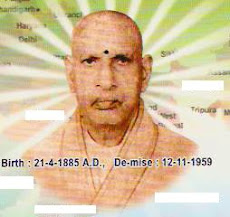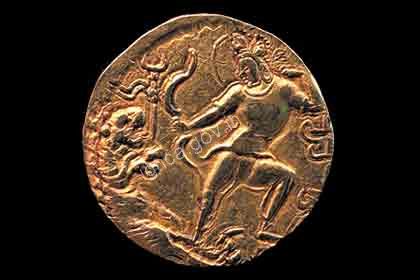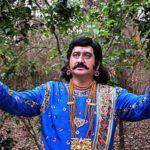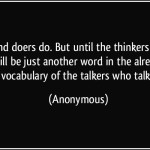
While this is by now a line so well known that it is almost cliche, few of us meditate on it. But what is lesser known is that even fewer still meditate on another insightful history quote.
Frederick the Great was a brilliant Soldier-King of Prussia (a leading German kingdom of the 17-1800s) who is considered one of history’s finest generals. He wrote that[1]:
“History is the School of Princes”.

And yet, our parents today consider this history to be “fluffy stuff” and an unworthy pursuit for their little rajakumaras. Why? Because understanding history makes for good rulers but poor servants. Despite the silly conceits of Indians in general, and NRI Andhras in particular, engineers, doctors, and coders are not rulers—just glorified workers. Real ruling classes and true elites have a sound understanding of history, and how it is frequently manipulated.
But to understand the importance of history, let us first understand what history is.
What is History
“Most people, in fact, will not take the trouble in finding out the truth, but are much more inclined to accept the first story they hear.”
― Thucydides, The History of the Peloponnesian War
History is the study of past events as they apply to the human condition. It seeks to understand what happened, why it happened, at what are the ramifications of it. It is more than mere national myth, kaakamma kaburlu (old wives’ tales), or the dry recitation of dates and personalities. While an element of Romance and Adventure adds excitement to it, as Thucydides (the Ancient Greek historian) wrote, history is ultimately about the cold hard study of recorded facts weighed against the truth. Thus the entire modern Marxist method of emphasizing that “there is no truth, only perspective” is in fact the greatest lie of all. There is objective truth, there must be objective truth, for without it, we have only relativist subjectivity that allows fools to be led astray and the wicked to believe their own lies.
As such, while there may be a rhetorical flourish here, and a romantic tale there, history is ultimately about the the dispassionate and truthful study of human events and society.
What is the Use of History
“Study history, study history. In history lies all the secrets of statecraft” – Winston Churchill.
While Churchill is surely no friend to any Indian (a matter which the deracinated among us still fail to grasp), he was surely no stranger to the uses of history, given not only his prime ministerial but also his imperialist track record.
While Westerners point to Herodotus as the father of history, and the British routinely loved to insinuate that Hindus had no concept of it, the reality is that the Dharmic tradition is replete with not just assorted puranas, but also charitras (chronicles), avadanas (narratives) and true itihaasas (histories) such as the Rajatarangini of Kalhana (the Kashmiri historian). Itihasa literally means so indeed it was, “iti ha asa”.
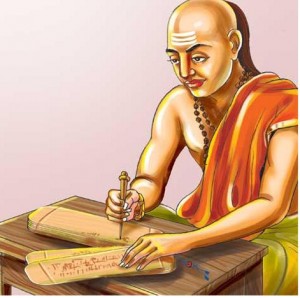
Our own Kautilya advised that a prince undergo strict training, for “intellect is the result of learning”and “in the latter part of the day, he [the prince] shall listen to Itihasas]”. Thus, lack of historical curiosity is not an historical trait of Indians in general, but a trait of colonized Macaulay-putras who reject their own heritage without understanding its value. When our ancient political thinkers themselves advised of the importance of history, particularly in political matters, why do we continue to propagate the British-imposed fallacy that Indians had no concept of history–they did and they do, they have merely forgotten or been made to forget…
How History is Used
Most of us think that the history we read in school should suffice and serve as the benchmark for how we view ourselves. However, what is taught in India today, and about India in much of the rest of the world, is colonial in nature and British in bias.
As we’ve said repeatedly on this site, if you don’t know where you are from, you don’t know where you are going. And Indians (especially Andhras) continue to remain the most clueless bunch. Easily swayed by praise, they thoughtlessly bring outsiders into their innermost ranks. They fail to recognize that China’s closest equivalent to Chanakya said this millennia ago: “All warfare is deception”. Yet we continue to sway under the naïve notion that for “civilized people” war and politics remain separate from economics, religion, culture, and even history. In fact, another great Prussian General, Carl von Clausewitz said “War is the continuation of politics by other means”. Thus if war is political and politicized, why wouldn’t history be? If knowledge is power, why wouldn’t the war of ideas be a matter of life and death?
The British use of history was no accident. It was a conscious move to play with the native historical record and to alienate Indians from their own tradition. It is for this reason that the entire “Invasions” leitmotif continues in Indian history to this day. The colonial monologue goes that “India was always invaded and invasion brought civilization, i.e. “Aryans” so the British were merely taking the next step to “civilize” Indians. In fact, India is an invention of the British”.
The irony of course is that anyone remotely acquainted with British history realizes how many times those islands were invaded (Romans, Angles/Saxons/Jutes, Vikings, Norman-French). In fact, their entire culture is a product of invasion, and if one reads the History of the Kings of Britain, even their mythical history is traced to the Asiatic Trojan invader Britannicus. Perhaps it’s true what they say: superiority complexes are built upon inferiority complexes.
Irrespective, this reductive view of Indian history is nonsense. For starters, many invasions–in fact the majority–were beaten back. Ancient India historically had a reputation for defeating and utterly routing foreign invaders. Alexander of Macedon had himself been cautioned about India, having bean told of how few soldiers the Assyrian Queen Semiramis (circa 9th century BCE) returned after being humbled by the Indian King Stabrobates, and how Cyrus of Persia lost his life on the Indian frontier. Alexander himself did not fare much better–but remains the subject of debate due to colonial British lionization of him. The same Huns that killed the Persian Emperor Firoz had been first defeated by Emperor Skandagupta and ultimately tamed by King Yasodharman of Malwa. Even the Arab Caliphate had virtually given up invasion of India, having been defeated many times, as established by their own histories (Chachnama). What’s more, even Bin Qasim’s conquest of Sindh proved short-lived, with the Rajputs of western India decisively defeating the Arabs, succeeding where Persia, Egypt, North Africa, Spain, and even Chinese-ruledTurkestan (in modern Xinjiang) had all failed.
Even the Indian worldview was reflective of this according to the Khorasani chronicler Alberuni: ” the Hindus believe that there is no country but theirs, no nation like theirs, no kings like theirs, no religion like theirs, no science like theirs. They are haughty, foolishly vain, self-conceited, and stolid…According to their belief, there is no other country on earth but theirs, no other race of man but theirs, and no created beings besides them have any knowledge or science whatsoever.”
Given all this, what was the British tactic that was able to shake the foundation of Indian historical consciousness (or even arrogance as Alberuni would say) so thoroughly? A recent controversy regarding the historicity of a certain quote gives us a glimpse:
“I have traveled across the length and breadth of India and I have not seen one person who is a beggar, who is a thief. Such wealth I have seen in this country, such high moral values, people of such calibre, that I do not think we would ever conquer this country, unless we break the very backbone of this nation, which is her spiritual and cultural heritage, and, therefore, I propose that we replace her old and ancient education system, her culture, for if the Indians think that all that is foreign and English is good and greater than their own, they will lose their self-esteem, their native self-culture and they will become what we want them, a truly dominated nation.”
Now for the sake of argument , even if we accept that this quote attributed to Macaulay is not in fact valid and is apocryphal (bearing in mind a valid quote would have major European PR implications), is it really that much worse than the following Macaulay quote that all parties unequivocally accept as valid:
“We must at present do our best to form a class who may be interpreters between us and the millions whom we govern, –a class of persons Indian in blood and colour, but English in tastes, in opinions, in morals and in intellect.”
What better way to do this then to make Indians ashamed of their own history? After all, if an Indian had pride in his history (as Alberuni angrily confirmed was the case once) or understood the true worth of Sanskrit and other Indian languages such as Telugu, he would not think so overwhelmingly about English, and give importance to it regarding “tastes, in opinions, in morals and in intellect“.
In fact, whatever the validity of the first Macaulay quote, our own learned men of the time had recorded how British colonizers had in fact been playing with our history and even historical record, showing just how insidious the second Macaulay quote really was.
But before Macaulay-putras and their fellow travelers again attempt to attack the strawman of the first quote (crying “fascism, chauvinism, brahminical conspiracy,” and God knows what else), perhaps they should first recognize that Macaulay himself was an historian of sorts, and a dubious one at that by the accounts of his own fellow Englishmen. So it seems neither he, nor his fellow European imperialists, were unaware of the uses of history and how the past can be distorted to serve present and future ends.
…and is Still Used Today
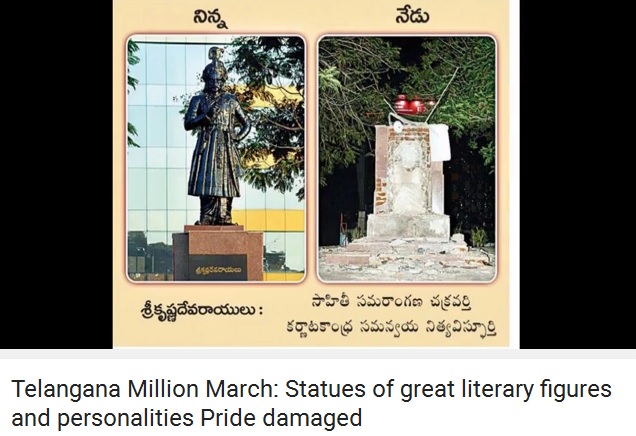
Nowhere was this better seen than in the unfortunate case of the Telangana agitation. While the bifurcation is said and done (so don’t worry my dear TG readers…), the way it was done was absolutely appalling. Not only was brother turned against brother, but history itself was turned upon its head. This gang went as far as to even praise the very oppressors of their own ancestors. Thus, the destruction of these statues, particularly that of Sri Krishna Deva Raya, who defeated and humiliated the Qutb Shahis of Golkonda, shows whose dirty work they were actually doing. This is why it’s important to understand who the puppets and puppet masters really are.
A scholar/propagandist was enlisted to not only create a case for Telangana, but to even invert history by diluting the word “Andhra” (the glorious ancient name of all Telugu speakers to mean only those from the Coast). While observers may glibly refer to this as a minor issue, the reality is, by diluting the Andhra brand, the case for another brand is slowly being made. After all, the best way to boil a frog is to slowly raise the temperature, rather than all at once.
Most ironically, the self-same politician who maligned Seemandhrites as “settlers” had no problem allying with Perso-Turkic “colonists” who advocate “Ganga-Yamuna Tehzeeb” in place of Telugu culture. They have the gall to demand privilege for their culture when they have never shown respect for our far more ancient and cultivated tradition, on our own land.
How Dharmic Indians must Use History
After seeing just how history has been used (and abused) in the hands of others, many Dharmic Indians may be think, let us just rebut this slander and write a glorious nationalist history. But two wrongs do not make a right. Replacing a nation-breaking history with an overly glossy nationalist one actually does a disservice to the nation. For a nation that only thinks of glorious achievements without understanding and analyzing past mistakes is doomed to repeat them.
Still others may say ask that if others have distorted our history why should we not do the same? But for the very nation whose motto is Satyameva Jayate, such an action is not only contrary to our traditions, it is foolishness. For you see, the society that has ever-prized the truth above all things, even given the world such noble lovers of Satya as Satyakama Jabala, Satya Harishchandra, and Dharmaraja Yudhisthira, the truth will in fact be the very light the reveals our glory. For while the lie lives ever in fear and doubt of discovery, truth knows no fear.
Though it unmasks the machinations of others, with the sword of truth lies not only our greatest weapon, but our redemption itself. Lies divide, but it is the truth that unifies, whether it is all Andhras, all Indians, or all of Humanity itself. Therefore, it is incumbent on Dharmics to use history for precisely the purpose it was meant to–only we must do it better.
While our traditional scholars may have been meticulous at recording facts, communication of these facts must not be done in a mechanical manner. They must be done in a way that not only educates and inspires, but also instills a rational compass allowing the young student to read history, and if necessary, navigate it. As Frederick the Great of Prussia said, “Past facts are good to store away in the imagination and the memory: they furnish a repository of ideas whence a supply of materials may be obtained, but one which ought to be purified by passing through the strainer of the judgment“.[1] Even the great Greco-Roman historiographer, Polybius wrote in his work that “personal investigation” is the greatest quality of an historian. He went still further by emphasizing how men of action, rather than mere arm-chair observers, made the best historians–for they knew the value of what they were recording.
Thus mere rote memorization of history alone is not enough; one must use logic, analysis, and the historical method to understand the applicability and validity of these past ideas, so that students, politicians, and even generals, will draw the correct lesson–Acharya Kautilya would expect nothing less of us.
In light of all this, the history of the descendants of Dharma and Indic Civilization must be based on the truth, rooted in our Indic tradition, weighed by the historical method, valid in educational purposes, and communicated in a way that inspires.
In doing so, the next generation of responsible citizens, Army Chiefs, and Prime Ministers will recognize that India’s unity is not only worth defending, but will also learn how best to defend India’s unity. In tandem with that, they would see that our Dharmic Kings were worthy of emulation given that they were manly and trained in the arts of war in addition to being equally cultivated and cultured (as seen here with Emperor Samudra of the Gupta dynasty and below where he uses a bow in one coin and plays a veena in the other)
The same Soldier-Emperor who became the paramount ruler of India was skilled not only in the force of arms, but in the mastery of music. This demonstrates that the among the archetypes for our leaders was not a dichotomy between unschooled barbarian and milquetoast musician, but the cultivated and cultured King, who could protect civilization all while engaging in its highest artforms.
Ultimately, it is not enough to merely study history in school or even earn a degree in it. Rather, what must be taught is how to navigate history using the historical method, logic, and analysis. While indigenous chronologies and chronicles can serve as a foundation for our historical record, they should be tested against the evidence of the time as well. Trust, but verify. For in an era where knowledge is power, the war of ideas becomes a matter of life and death…and what is history if not that?
References:
- Frederick the Great. p.47,49
- Arthashastra.p.143

